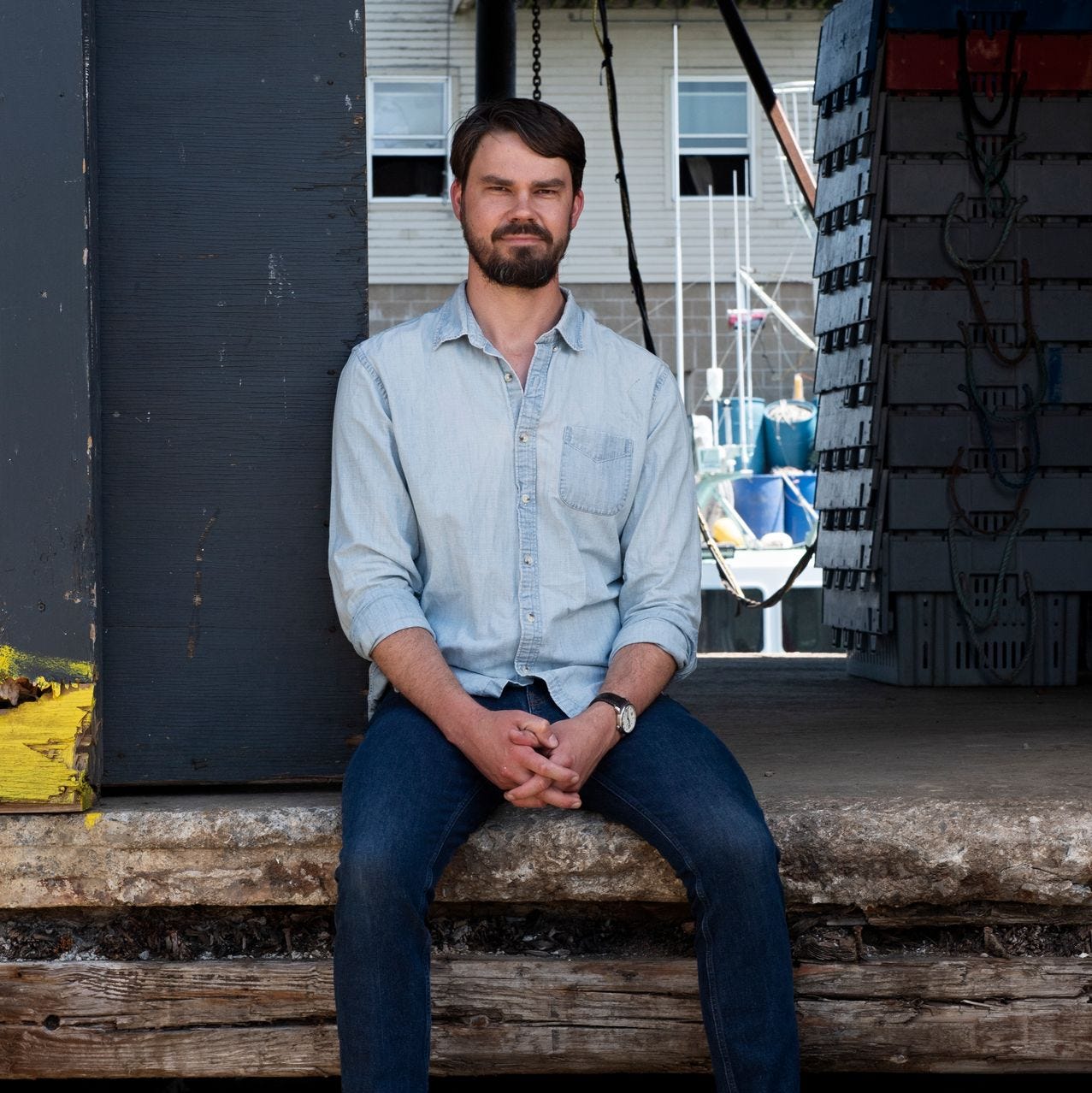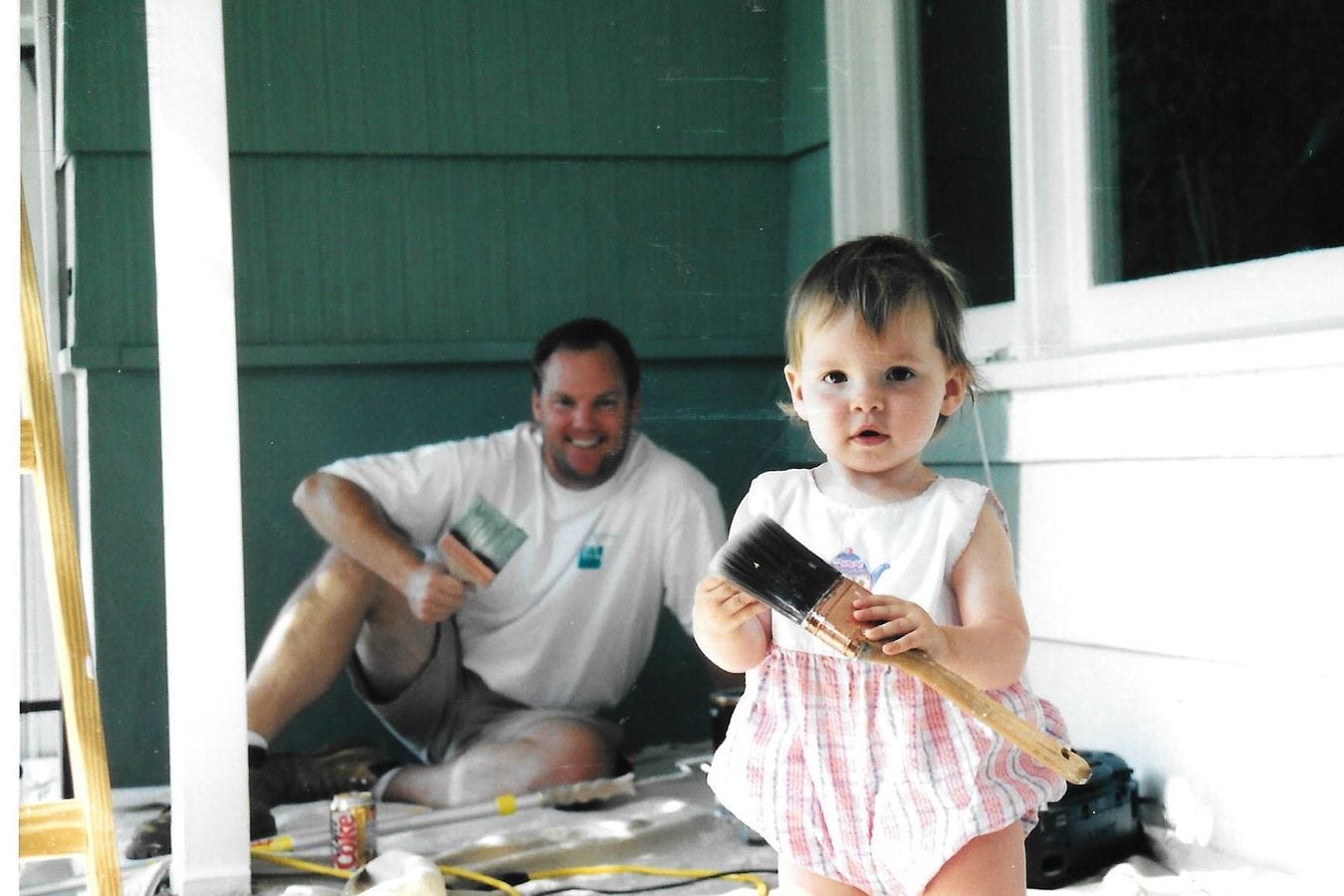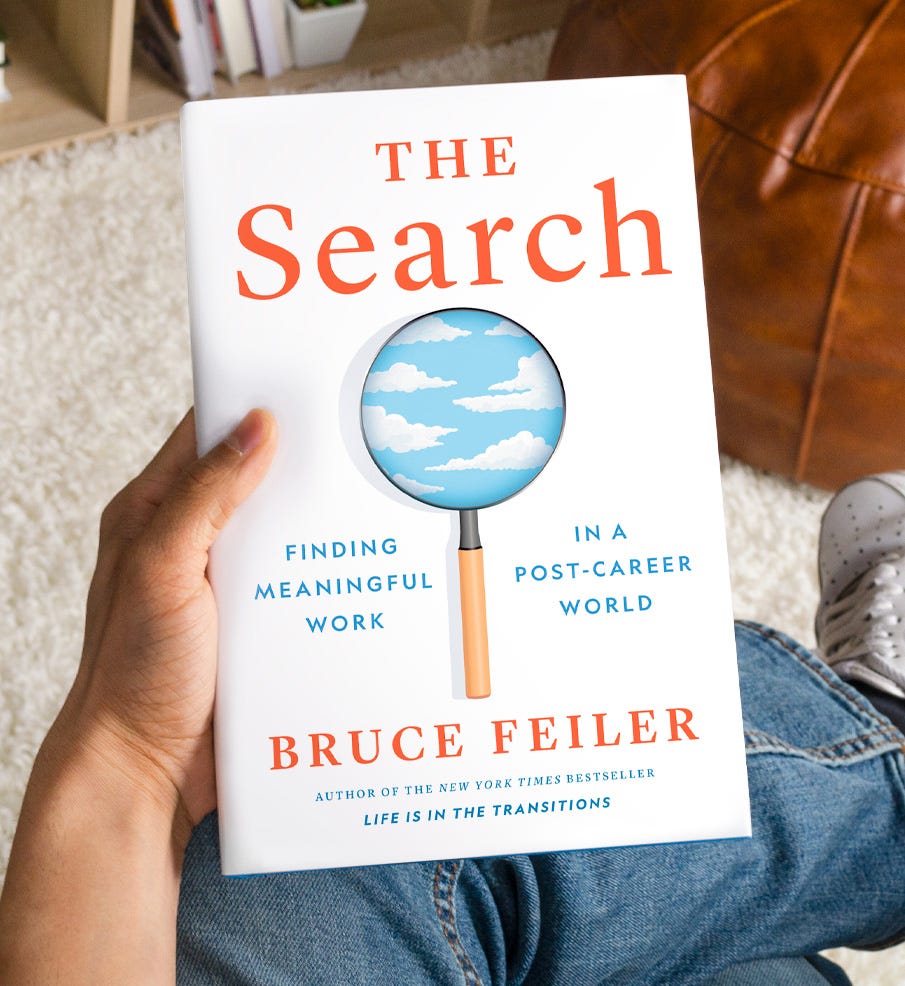The New Rules of Success in a Post-Career World
How THE SEARCH Won Over the Editors of the Wall Street Journal

I think it’s fair to say there was skepticism: “You can’t deliver this message in the Wall Street Journal. After all, there’s WALL STREET in the title! WSJ readers are about money, not meaning.” But thanks to a masterful editing job, there it was, spread over two pages in the paper of record for work and careers, the first excerpt of my new book, The Search, which explores how a new generation of workers is embracing meaning over money.
The piece has generated a huge conversation online, and I’ve heard from readers around the world. Along with recent appearances on CNBC, MSNBC, the Hello Monday! podcast, and this super-generous review in the WSJ itself, I’m deeply grateful that the book is winning over even the most suspicious of audiences. Here, as a special treat for subscribers, you can read the excerpt from the Journal for free.
___
Ever since a poor, bedraggled Benjamin Franklin strode into Philadelphia in the opening of his “Autobiography,” then strutted out decades later a wealthy celebrity, Americans have been telling a singular story of success: rags to riches, up by your bootstraps, bigger office, higher floor, larger salary, better view.
But that national myth has always focused too exclusively on one type of hero and one metric of achievement. From Horatio Alger to Dale Carnegie to Stephen Covey, the American ideal of success has been built almost entirely around ambition, wealth and status.
By contrast, the dynamic workforce of today—younger, more female, more diverse—is eager to rewrite the American success story in its own image. They are flouting old norms to achieve success on their own terms.
Unprecedented numbers of Americans are walking away from their jobs, rethinking their routines and breaking away from traditional expectations. Fifty million Americans quit a job in the last year, and another third of the workforce is renegotiating where, when and how they work. Three-quarters of Americans in a recent survey said that they plan to look for new work this year.
Over the last few years I’ve crisscrossed the country, trying to understand the roots of these shifting standards and what they mean for workers and the organizations that hope to recruit and retain them. I’ve collected 400 extensive life stories of Americans in all 50 states, interviewing everyone from CEOs and mom-and-pop proprietors to schoolteachers and line workers. I concentrated on the broad middle class, steering away from the poorest of the poor and the richest of the rich. (I’ve used below the ages of my subjects when I spoke to them.)
What I discovered is a subtle but profound shift: Today’s workers are increasingly rejecting the script that has long defined the American Dream. They rebuff the notion that each of us must follow a linear career—lock into a dream early, always climb higher, never stop until you reach the top. They resist having their lives summarized by a résumé.
Many Americans still define career goals and try to achieve them, of course, but far more people experience an endless barrage of interruptions. My data show that the average worker goes through a moment of disruption, reevaluation or reinvention every two and a half years—what I call a “workquake.”
Just under half of these inflection points begin in the workplace; they involve a conflict with a boss, changing employers or renegotiating your current role. But the majority are motivated by events outside of the workplace. Something happens with our families, our health or our mindsets that causes us to rethink our employment. In the balance of power between work and life, life is playing a greater role.
This shift hints at a larger change: Today’s workers are focused as much on the quality of their lives as on the quality of their jobs. Gallup found that millennials and members of Gen Z, who now make up half the workforce, place their greatest emphasis on well-being at work. Deloitte heard from the same group that work/life balance was their number one priority. High salary and other financial benefits came in well behind, with only one in four mentioning it.
My conversations crystallized the extent of these changes. Fewer Americans are searching merely for work these days; more are searching for work with meaning. Some still emphasize wealth and status, but others stress service, self-expression or personal fulfillment. For almost everyone, their personal script evolves and morphs over time.
With so much fluidity, the challenge is how to determine at any given moment what metrics of success matter most to you. Is now the time to give priority to generating wealth, spending time with family or giving back? Faced with a stream of choices, many of us get writer’s block trying to write our own story of success.

What we lack is a new set of standards to guide us. I’d propose three.
1. Success is digging, not climbing.
Much of our discourse about work focuses primarily on how to get a job. The problem with this approach is that it usually works: You find a job, you maintain the appearance of success. But you won’t necessarily be fulfilled, because you won’t have taken the time to identify what actually makes you happy, and soon enough you’ll be back where you started.
The people who are most fulfilled at work don’t start with how; they start with who they want to be, what they want to be doing and why they want to be doing it. In other words, they don’t just climb, they also dig. They perform what I call a “meaning audit,” doing personal archaeology to unearth the lessons of work they inherited from their parents, the values they admired in their role models and the dreams they’ve been nursing since childhood.
As Mark Savickas, a professor at Kent State University and the dean of modern career studies, told me, “The answer is not in society. It’s not in test scores. It’s already inside you.” He calls this untapped internal wisdom your “unknown known” and says any successful job search requires giving the searcher “the tools and the confidence to unlock the story they’ve already been writing for years—even decades.”

Karléh Wilson, 27, was born in Louisiana but moved to California in her girlhood so that her father, a church music director, could pursue a career as a jazz musician. Wilson found work in what she thought was the meaningful field of affordable housing, but in shock and grief after her boyfriend was murdered, she sat down and wrote a song. “I realized I had this gift from God and my father to make myself and others feel better through music.” So she left her job and became a jazz singer.
“My dad wanted me to go to college, get a great career and make a bunch of money,” she said. “No one in our family had ever done that. But as soon as I started, I thought, ‘Is this how people live? You work hard and nothing changes.’ The answer, it turns out, was inside me all along.”
Tim Pierpont, 54, grew up in an adoptive family in Connecticut, where he loved woodworking and art projects; after college, he briefly opened a painting company. But he felt pressured by his family to pursue more “acceptable” work and took a job in corporate real estate, where he stayed for 22 years.
After watching a colleague unexpectedly die from cancer, though, he experienced a crisis: “Is this really what I wanted to do for the rest of my life?” He went to a coffee shop and made a list of five things that were most meaningful to him, including feeling part of a community, being outside and working with his hands. “And then it hit me. If I were running a painting company, I would be doing all three right now.” He soon started Pierpont Painting.

2. Success is meaning, not means
In my conversations, I asked everyone to identify the biggest turning point in their work lives and whether it led to a step forward, a step backward or a lateral step. The overwhelming majority said a step forward. Of those people, 50% said they made less money afterward; 41%, more money; 9%, the same. Put another way: Among those who said their work transition improved their lives, six in 10 made the same or less money than before.
Others have reached similar conclusions about the place of money for today’s job seekers. In a 2017 paper, researchers Jing Hu and Jacob Hirsch of the University of Toronto’s Rotman School of Management found that if workers consider a job meaningful, they’re willing to accept salaries that are 32% lower than for work that isn’t. A 2018 study by Shawn Achor and colleagues published in Harvard Business Review found that nine out of 10 workers were willing to give up a quarter of their entire life earnings in exchange for work that’s meaningful.
To be sure, millions of Americans still view money, wealth and net worth as primary sources of meaning. Depending on your upbringing, such material success might represent freedom, security or self-worth. And, of course, many forms of work we might find meaningful don’t necessarily meet our practical needs at a given moment.
The difference between the past and today is twofold. First, if our main job leaves us unfulfilled, we might layer in other types of work for meaning, including a side job or what I call a “hope job”—the work so many of us do, like writing a screenplay or selling pickles at the farmers market, in the hope that it will lead to something in the future.
Second, we might choose to give priority to earning money during certain periods of our lives while giving greater weight at other times to creativity, public service or caring for loved ones.
Harmit Malik, 48, whose family fled from Pakistan to India after the partition of 1947, eventually moved to the U.S. and became a geneticist in Seattle. “The imprint of refugees,” he said, “is that they want to be conservative, establish roots and do nothing to jeopardize their success.” Malik set out to fulfill those expectations with “scientific achievement and selfish accomplishment.”
But after having a son with a disability, Malik shifted his priorities: “I don’t have the aspiration to start a huge company and make a ton of money. It upsets a lot of people when I say this, but I’m very happy with the life I have. I can be a mentor; I can spend time with my special-needs son; I can write fiction.” He added, “We’ve become trapped by getting on an escalator and rising far beyond where we’re comfortable. I’m perfectly happy to step off that escalator.”
Ben Conniff, 36, was a food writer in New York City when he answered an ad on Craigslist from an investment banker who was looking for a co-founder to open an artisanal lobster roll shack. Luke’s Lobster went on to open 30 restaurants and generate $80 million a year in sales. But Conniff, whose true love was food, not managing a business, stepped back from his day-to-day responsibilities to lead the company’s efforts to build a sustainable seafood ecosystem in Maine.
“There’s a role in business for people like me. People who put purpose over profit,” he said. “Especially as younger generations come into more purchasing power, people will realize that there’s value in values.”
3. Success is story, not status
The final new rule of success may be the most consequential: Success is not fixed; it’s ever-changing. It’s not a destination; it’s a narrative. Freed from the myth of the corporate ladder and confronting multiple opportunities to rethink our work stories, many of us are making choices that serve our varied needs at different times in our lives.
When there is no single definition of success, there is no penalty for choosing your own definition of success.
Jasminne Mendez, 36, was a newly engaged teacher of theater and creative writing at a middle school in Houston when a serious health problem forced her to step down. “I thought I had a dream life,” she said. “Then I got a rare chronic illness and boom! I had to give myself a serious sit- down. It wasn’t, ‘Girl, what are you going to do?’ It was, ‘Girl, you need a new story.’ I’m grateful that in this country at least we’ve normalized starting over.” She turned to writing full-time and has published two YA novels.

Issa Spatrisano, 34, grew up as the peacemaker in a large family in Michigan and dreamed of becoming a basketball coach. But a semester abroad in college inspired her to switch to international relations. After following her partner to Alaska, she started teaching English as a Second Language, and her life took a “drastic turn.” Spatrisano was invited to join the state’s refugee resettlement office to run its education program. “I love a chaotic environment,” she said. “Nothing is more chaotic than a refugee resettlement program.” Today she runs the entire statewide agency and says she’s learned from her clients the benefits of embracing real freedom of opportunity.
“The problem with the story we’ve been telling in this country is that it’s too focused on meeting certain qualifications. The American story shouldn’t be about the house I own, or the car I drive, or the money I make,” she said. “It should be about the ability of all of us to tell our individual stories and the ability of the rest of us to hear those stories in a spirit of welcome and understanding.”
☀
Thank you for reading The Nonlinear Life. This is a reader supported newsletter. You can help by ordering a copy my new book. Click on the photo below to learn more.
Meanwhile, please help us grow the community by subscribing, sharing, and commenting below. If you'd like to do a storytelling project with a loved one similar to the one I did with my father, click here to learn more.
You might enjoy reading these posts:
Hear Me with Gwyneth Paltrow, George Stephanopoulos, and NPR. Highlights of Day 1 of My Book Tour!
Read the Opening Pages of THE SEARCH
How a Hollywood Sex Scandal Turned One Woman's Life Upside Down
Or, you can contact me directly.




I did not see a discussion of how important savings and fiscal stability is to being able to try meaningful work. Especially important if one is supporting a family. Also, employers offering more meaningful choices are not always willing to take a chance on someone with no background in the new field or job choice.